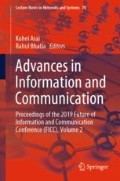Abstract
Modeling complex environments is a challenging problem that is compounded when there are multiple agents acting together as a team, and the team needs to maintain its own goals while allowing the agents to have some level of autonomy. We prepose a modeling framework for strategy-based multi-agent multi-team simulation environments. For these types of environments it is necessary to have a modeling infrastructure that allows for high-level, high-complexity, hierarchical interactions where team goals are prevalent but individual needs are balanced. Such modeling is proposed in this paper – modeling that will avoid large, monolithic models while maintaining complexity of expression balanced with simplicity of operation.
Access this chapter
Tax calculation will be finalised at checkout
Purchases are for personal use only
References
Bowling, M., Veloso, M., et al.: Existence of multiagent equilibria with limited agents. J. Artif. Intell. Res. (JAIR) 22, 353–384 (2004)
Greenwald, A., Hall, K., Serrano, R.: Correlated Q-learning. ICML 20, 242 (2003)
Hu, J., Wellman, M., et al.: Multiagent reinforcement learning: theoretical framework and an algorithm. In: Proceedings of the Fifteenth International Conference on Machine Learning, vol. 242, p. 250. Citeseer (1998)
Laviers, K., Sukthankar, G., Aha, D.W., Molineaux, M., Darken, C., et al.: Improving offensive performance through opponent modeling. In: AIIDE (2009)
Littman, M.: Markov games as a framework for multi-agent reinforcement learning. In: Proceedings of the Eleventh International Conference on Machine Learning, vol. 157, p. 163 (1994)
Parson, Simon, Woolridge, Michael: Game theory and decision theory in multi-agent systems. Auton. Agents Multi-Agent Syst. 5, 243–254 (2002)
Stone, P., Veloso, M.: Task decomposition and dynamic role assignment for real-time strategic teamwork. In: Intelligent Agents V: Agents Theories, Architectures, and Languages, pp. 293–308 (1999)
Treuille, A., Lewis, A., Popović, Z.: Model reduction for real-time fluids. In: ACM SIGGRAPH 2006 Papers, SIGGRAPH ’06, pp. 826–834. ACM, New York (2006). 10.1145/1179352.1141962. http://doi.acm.org/10.1145/1179352.1141962
Treuille, A., Lewis, A., Popović, Z.: Model reduction for real-time fluids. ACM Trans. Graph. 25(3), 826–834 (2006). 10.1145/1141911.1141962. http://doi.acm.org/10.1145/1141911.1141962
Author information
Authors and Affiliations
Corresponding author
Editor information
Editors and Affiliations
Rights and permissions
Copyright information
© 2020 Springer Nature Switzerland AG
About this paper
Cite this paper
Michael Franklin, D. (2020). Hierarchical Modeling for Strategy-Based Multi-agent Multi-team Systems. In: Arai, K., Bhatia, R. (eds) Advances in Information and Communication. FICC 2019. Lecture Notes in Networks and Systems, vol 70. Springer, Cham. https://doi.org/10.1007/978-3-030-12385-7_25
Download citation
DOI: https://doi.org/10.1007/978-3-030-12385-7_25
Published:
Publisher Name: Springer, Cham
Print ISBN: 978-3-030-12384-0
Online ISBN: 978-3-030-12385-7
eBook Packages: Intelligent Technologies and RoboticsIntelligent Technologies and Robotics (R0)

